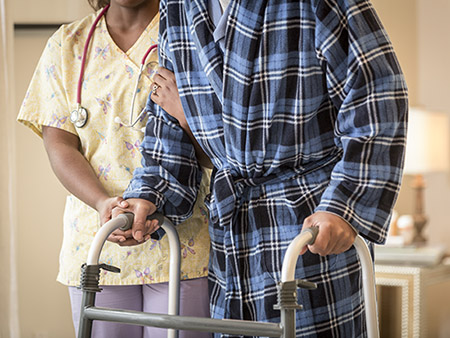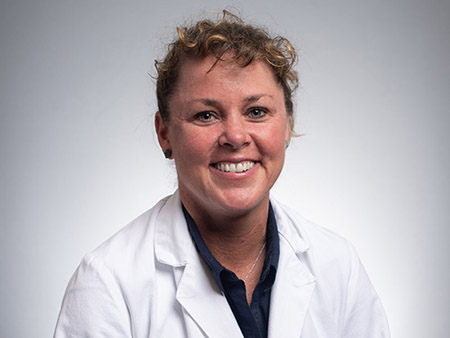 These findings have important implications for caregiver behavioral health programs designed to promote resilience and draw upon caregiver strengths when taking on a caregiver role.A new study published in the Archives of Physical Medicine and Rehabilitation shows that caregivers of injured service members may need care themselves.
These findings have important implications for caregiver behavioral health programs designed to promote resilience and draw upon caregiver strengths when taking on a caregiver role.A new study published in the Archives of Physical Medicine and Rehabilitation shows that caregivers of injured service members may need care themselves.
More than 2.5 million United States servicemen and -women have been deployed in Iraq and Afghanistan since 2001, and in turn, there have been an unprecedented number of traumatic physical and psychological injuries.
“The nature of combat engagement has resulted in the largest proportion of traumatic brain injuries, or TBI, in our nation’s history, with blast-related injuries representing the most common wounding etiology,” said lead author Laura Dreer, Ph.D., associate professor in the University of Alabama at Birmingham Department of Ophthalmology and Visual Sciences. “More than 80 percent are concussions or mild TBI.”
Dreer, who also serves as the director of Psychological and Neuropsychological Clinical Research Services, says there has been a significant proportion of service members’ returning with serious injuries requiring long-term care and support.
“The rates of mental health problems have also been well-documented,” she said in the study, “with some research showing greater risk for emotional problems three to seven months post-deployment.”
There are approximately 5.5 million military caregivers in the United States, and approximately 1.1 million provide care for service members after the events of Sept. 11, 2001. Many of these individuals function as informal caregivers by providing help, support, guidance or supervision to a person in need post-injury. This role is typically taken on with little training to meet the demands of caregiving, in addition to their own and other family needs, as well as the unique stressors that affect families from deployment alone.
“Military caregivers with TBI or other disabilities are dealing with issues similar to those that civilian caregivers experience after a loved one suffers from an injury,” Dreer said. “This is along with other unique stressors, such as an increased risk for post-traumatic stress symptoms and mental health issues they have to navigate. These can include stressors related to deployment and/or combat, different insurance policies and requirements they have to navigate through via the Veterans Administration, to name just a few,” Dreer said.
These stressors can take their toll on the emotional well-being and health of military caregivers, subsequently resulting in feelings of anger, resentment, frustration, helplessness and depression, which in turn may compromise the quality of care provided, the family system, parenting practices and more.
 Laura Dreer, Ph.D., Department of Ophthalmology and Visual Sciences.“A lot of times in health care, the focus is on the patient, which is definitely important in terms of medical stabilization, management of symptoms, etc.,” Dreer said. “However, most patients adjust to any type of injury or disability within the social context of family and friends. Unfortunately, they are not seen as ‘patients’ in need of medical attention, despite being thrown into the role of a caregiver with little formal training, if any, yet they are asked to serve as informal extensions of health care. Attention to caregivers also is not typically something providers can bill for, which is another barrier to preventive services in light of what we know about the challenges and stressors related to caregiving and the toll it can take on both the caregiver as well as the care-recipient.”
Laura Dreer, Ph.D., Department of Ophthalmology and Visual Sciences.“A lot of times in health care, the focus is on the patient, which is definitely important in terms of medical stabilization, management of symptoms, etc.,” Dreer said. “However, most patients adjust to any type of injury or disability within the social context of family and friends. Unfortunately, they are not seen as ‘patients’ in need of medical attention, despite being thrown into the role of a caregiver with little formal training, if any, yet they are asked to serve as informal extensions of health care. Attention to caregivers also is not typically something providers can bill for, which is another barrier to preventive services in light of what we know about the challenges and stressors related to caregiving and the toll it can take on both the caregiver as well as the care-recipient.”
Furthermore, Dreer says, these caregivers often take on such responsibilities with little reward or recognition for their important role.
“What is interesting to me is how well many of these caregivers learn how to adapt successfully to this role,” she said. “My team and I wanted to study these caregivers in terms of the factors related to successful adjustment and even post-traumatic growth.”
Dreer says this type of research is needed to help understand the factors that are related to resilience in caregiving.
“So much of the research is focused on risk factors to caregiving and burnout,” she said. “While that research is certainly important, our study’s focus brings attention to caregiver strengths and understanding protective factors in caregiving such as resilience and the impact it has on health outcomes. Interventions that can foster building upon caregiver strengths may help military families refocus on things they are doing well to foster self-efficacy and confidence early on in caregiving to buffer burnout.”
Dreer says the next steps are to examine caregiver resilience across time and to see how it buffers health outcomes on the service member as well as caregiver. They will use that information to develop a caregiver resilience intervention.
